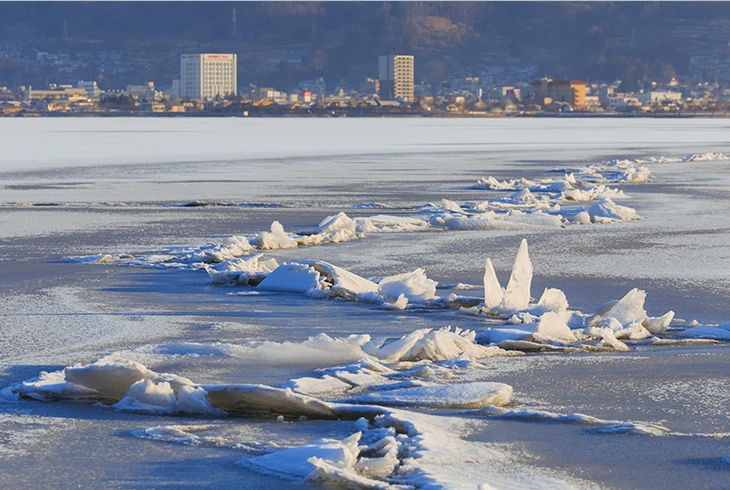
Ice breaks apart and forms folds resembling mountain ranges on the surface of Lake Suwa in Nagano Prefecture, also known as the Omiwatari phenomenon. - Photo: Nagano Prefecture/JNTO
In Japan, the unusual natural phenomenon known as "Omiwatari," in which ice forms on the surface of Lake Suwa in Nagano Prefecture and breaks apart to create folds resembling mountain ranges, has not appeared for the seventh consecutive winter. The cause is believed to be climate change and global warming .
Historical records from the Muromachi period (1336-1573) show that the number of winters without the Omiwatari phenomenon, also known as "Ake no umi," has increased significantly since 1951. Kiyoshi Miyasaka, the 74-year-old head priest of Yatsurugi Shrine in Suwa City, stated: "The signs of climate change and global warming are becoming increasingly clear on Lake Suwa."
According to legend, Omiwatari is the path that the male deity Takeminakata of Kamisha Shrine, part of the Suwa Taisha shrine complex in Suwa, took to visit the goddess Yasakatome of Shimosha Shrine in the nearby town of Shimosuwa. For that reason, Omiwatari is also known as the "path of love of the gods".
According to monk Miyasaka, the Omiwatari phenomenon was first recorded in 1397 in documents left by the Moriya family, who were once the heads of Kamisha Shrine in Suwa Taisha.
The "Ake no umi" phenomenon has occurred 81 times, including 40 times in the 75-year period since 1951. This rate has increased significantly since 2000, when 18 years without an Omiwatari phenomenon were recorded. Since Japan entered the current Reiwa era in 2019, Omiwatari has not reappeared.
Monk Miyasaka expressed his concern: "The ancient landscape of Lake Suwa is gradually disappearing. It may soon come a time when Omiwatari will only be a legend, a relic of the past."
This year, the Lake Suwa area also lacked particularly cold days. On January 20th – a day typically considered the coldest of the year in Japan – the air temperature recorded at a weather station south of Lake Suwa was 0 degrees Celsius, while the water temperature was 3.2 degrees Celsius.
Although a cold air mass on February 9th and 10th caused temperatures to drop to minus 10 degrees Celsius and much of the lake's surface to freeze, the ice melted after only one day. No further cold air is forecast for the area, making this year's winter "Ake no umi" (a cold spell).
Currently, the longest period without Omiwatari is eight consecutive winters from 1507 to 1514 during the Sengoku period of the 15th and 16th centuries. The current period is the second longest, followed by the period from 1992 to 1997 with six winters without Omiwatari.
Source: https://tuoitre.vn/trai-dat-nong-len-xoa-so-con-duong-tinh-yeu-cua-cac-vi-than-o-nhat-20250317145339151.htm















![[INFOGRAPHIC] Top world events of 2025](https://vphoto.vietnam.vn/thumb/402x226/vietnam/resource/IMAGE/2025/12/24/1766534568261_thumb-su-kien-the-gioi-jpg.webp)


















































































Comment (0)